Blogging Beers
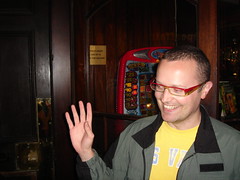
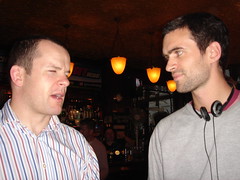
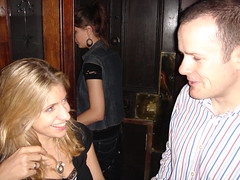
In the absence of Russell, Paul and I thought we'd try and carry the great man's mantle. The draw of Paul and I wasn't quite up there with Mr Davies but we still managed to persuade Ben and Sophie to turn up.
Conversation ranged from 'fuck me facts' to Google Analytics to vegetarianism. Apologies to anyone in the George pub that overheard us and was offended/bored.
It was good to see Ben again and a pleasure to meet Sophie. Paul, it's always a pleasure to see you too mate.
posted by Henry Lambert at Friday, September 22, 2006
0 comments


Blogging Drinks
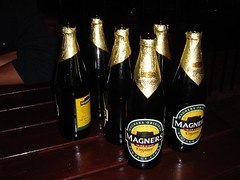 In Russell's absence, Paul and I will be having a blogging drink tonight (Friday 22nd September) at 6pm in Soho.
In Russell's absence, Paul and I will be having a blogging drink tonight (Friday 22nd September) at 6pm in Soho. We'll be at this pub, so feel free to drop in and say hello!
posted by Henry Lambert at Friday, September 22, 2006
0 comments


Some fun from Nike
Materazzi training.
posted by Henry Lambert at Thursday, September 21, 2006
0 comments


Cornwall
 Sorry for the lack of posts recently, but I've been at my parents new house in Cornwall. Lovely part of the world. Anyone who's never been should go, just avoid Newquay.
Sorry for the lack of posts recently, but I've been at my parents new house in Cornwall. Lovely part of the world. Anyone who's never been should go, just avoid Newquay.
posted by Henry Lambert at Thursday, September 21, 2006
0 comments


Emerge
 Emerge is the latest addition to the Influx Insights blogging stable. The aim of Emerge, according to Ed Cotton, is to cover all things relating to emerging culture, focusing on the people and places that reflect and represent it.
Emerge is the latest addition to the Influx Insights blogging stable. The aim of Emerge, according to Ed Cotton, is to cover all things relating to emerging culture, focusing on the people and places that reflect and represent it. Emerge focuses on film, art, music, fashion, design, places & spaces and also has interviews with leading lights across these sectors.
posted by Henry Lambert at Thursday, September 21, 2006
0 comments


Apple
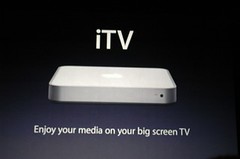 I feel obliged to blog this. Apple have announced a underwhelming variety of new/modified products.
I feel obliged to blog this. Apple have announced a underwhelming variety of new/modified products. * The iTV - great product, but Apple announcing it before it was ready???!
* New and very tiny iPod shuffle
* Updated 5G iPod - brighter screen or something
* New colours on the Nano
What's going on with Apple, where's the innovation gone? I can't remember the last genuinely new and interesting development.
posted by Henry Lambert at Wednesday, September 13, 2006
1 comments


The Varifier Approach

If anyone has read James Surowiecki's book, the Wisdom of Crowds, they will be familiar with the story of the US submarine, Scorpion, that disappeared on its way back to land. Despite the Navy holding various bits of data about the sub, such as its location the last time it had made radio contact they had to find it in a possible circular area which had a 20 mile diameter and thousands of feet deep.
To solve this problem, a naval officer called John Craven created a series of scenarios to explain what had happened to the Scorpion. He then asked an eclectic mix of experts, such as mathmaticians, salvage men and submarine specialists to guess which of the scenarios was most likely. The experts guessed the speed the sub was going, why it ran into trouble and the steepness of the decent and other relevant information. Craven didn't select any one of the guesses, but took the guesses together and applied Bayes's theorum to them to get essentially the mean location of the sub.
The final location was a genuinely a collective judgement of where the submarine was but did not match any of the expets guesses exactly. Five monthas after the submarine disappeared a navy ship found it, just 220 yards fom where Craven's group had said it would be.
This story shows just how smart a crowd can be when it wants. Despite having little or no hard data, the experience and combined knowledge of the experts was accurate to a fraction of a percent.
A British psychologist, Gordon Rugg, has taken the theory behind Craven's success to another level. He has come up with the Varifier Approach. Rugg recognised that in all fields there is an 'expertise gap' that is often unrecognised and usually ignored. The varifier approach asks experts to draw a mental map of their field. From there Rugg puts different maps from different experts together to form an atlas of knowledge on any given subject. In fact 11% of papers published in Nature and the British Medical Journal had serious statistical errors, showing that experts often suffer fuzzy logic. Rugg explains his theory:
"You look for an area of overlap that doesn't contain much detail... If it turns out there's an adjoining area which everyone thinks is someone else's territory, then that's a potential gap."
Using this theory Rugg studied the Voynich Manuscript, a hand-lettered book written in an unknown code that has frustrated cryptographers since its discovery in an Italian villa in 1912. He discovered that if he focussed on all the thoughts that experts had ignored i.e. their knowledge gaps, he could see what they had missed and solve complex problems.
'In three months, he cooked up the most persuasive explanation yet for the 234-page text: Sorry, folks, there is no code - it's a hoax! Lifelong Voynichologists were impressed with his reasoning and proofs, even if they were a little chagrined. "The Voynich is such a challenge," says Rugg, "such a social activity. But then along comes someone who says 'Oh, it's just a lot of meaningless gibberish.' It's as if we're all surfers, and the sea has dried up."'
"The verifier method boils down to seven steps: 1) amass knowledge of a discipline through interviews and reading; 2) determine whether critical expertise has yet to be applied in the field; 3) look for bias and mistakenly held assumptions in the research; 4) analyze jargon to uncover differing definitions of key terms; 5) check for classic mistakes using human-error tools; 6) follow the errors as they ripple through underlying assumptions; 7) suggest new avenues for research that emerge from steps one through six."
The Varifier Approach demonstrates the power of the Medici Effect, combining more than two unrelated areas of expertise to create a more powerful and new idea, something that the best advertising and marketing does.
Rugg now hopes to apply the Varifier Approach to a range of subjects such as the origins of the universe and Alzheimer's disease.
Wired Article
Originally pulished on IF!
posted by Henry Lambert at Wednesday, September 13, 2006
2 comments


Wages of Wins
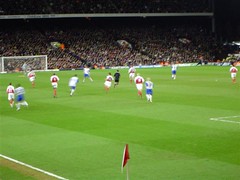 This website is brilliant. Wages of Wins is a book published in the USA that analyses atheletes indiviual performances in team sports and works out the correlation between performance (i.e. no of wins produced) vs their salary.
This website is brilliant. Wages of Wins is a book published in the USA that analyses atheletes indiviual performances in team sports and works out the correlation between performance (i.e. no of wins produced) vs their salary. I'm not really sure how to do the site and the concept justice in this post but I thought it was well worth highlighting how well they have taken the statistics of sport and applied them very accurately to gauging just how good an athelete is.
An example is this:
* Players who do many things well – like Michael Jordan, LeBron James, Shaquille O’Neal, Tim Duncan, and Kevin Garnett – are very productive players, just like most people believe.
* Players who only score, though, or have deficiencies in their game (i.e. low shooting efficiency, high turnover rates) – like Allen Iverson, Antoine Walker, and Carmelo Anthony – are not as productive as people believe.
* Players who are prolific rebounders – like Dennis Rodman, Ben Wallace, and Marcus Camby – are more productive than people tend to believe.
Wages of Wins calculates a players ability based on 'wins produced' or a 'win score'.
As a decent footballer myself I appreciate that it is often the most unspectacular players that are the most important to the team (e.g. Makelele) and it would be very interesting to see just how footballers came up were the wages of wins theory to be applied to the beautiful game.
Here's my favourite post, just for the record.
I'm sure the theory has an application to advertising and marketing (beyond the usual metrics), I just can't quite work out what it is yet.
posted by Henry Lambert at Friday, September 08, 2006
0 comments


My John Grant notes
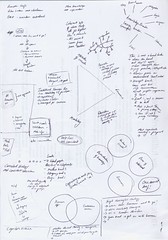 Here's my summary of Paul's John Grant podcast. My apologies for the messyness of the notes.
Here's my summary of Paul's John Grant podcast. My apologies for the messyness of the notes. John and Paul are both very smart.
John's second book after image was all about knowledge brands e.g. Google, Wikipedia & ebay rather than image brands such as Levi's and Coca-Cola. This helps put it into context looking back.
It is now a quest for knowledge not information. Education is an important role - how many people outside of Islington actually know what a smoothie is?
Research should be used as basically extra meetings for cracking problems or isolating problems
The future of marketing is molecular. A coherent set of ideas that all fit together like a molecule. It should seem as if it is all from the same author
Brands are about value creation and new adventures. For FMCG innovation has been centralised and becomes the news. Google doesn’t advertise. It relies on constant innovation and quality of service.
More important than marketing or branding strategy is business.
1. where does the business need to go?
2. It's not a marketing thought
3. It's a business decision
4. Ignore your brand and get on with business
Successful brands work by working towards and overall goal. E.g. Nike.
> They didn't want to be McSport
> They decided to move closer to sport through facilitation.
> They created distinct groups or cells within the company
> These groups acted autonomuosly but all pulled in the same direction
> Result the most successful sports brand on earth
Traditional through the line marketing is pointless. It is based on repitition, creates cliches and is managed for consensus
The old ingredients of Direct Response, Personality and a USP are no longer relevant. A brand would hire an ex Unilver marketeer, he'd brief the agency to create a brand campaign to be based around the concept of a USP, The agency would hire a celebrity to provide the personality for the brand, the brand would then have an image, this would be built on through repetition, cliches and consensus.
TV could provide the impact, interest and a mass audience.
Brands should follow a consitent strategy, not necersarily a consistent execution. After all only liars are consistent.
Brands can be different things to different people. Like the parable of 10 blind people describing an elephant.
To the media company a brand is…
To the ad agency a brand is…
To a desing agency a brand is…
One word equity is like describing an elephant as 'grey'. One word can work for copywriting but not for brands.
Media neutral planning is retrograde: It's not specific, It takes you away from what you are actually trying to achieve.
The famous Ikea brandbook:
This is not a brandbook
If you say the name of a brand people will have richer thoughts than 'passionate', 'intelligent', etc
The strongest brands have a very low self consciousness about other people's impressions of them
Brand is just a means to an end
Muji for example is just a pricing strategy as is Ikea.
The most important meeting for an agency is the pre-prod. This is where the idea actually comes to life and everyone starts to understand what they will eventually create.
posted by Henry Lambert at Wednesday, September 06, 2006
0 comments


Lebowski Blogs
The infamous Lebowski of W+K London has, after months of protestation, started his own blog. Worth checking out, Lebowski will be coming up with a new idea everyday. Looking forward to it.
posted by Henry Lambert at Monday, September 04, 2006
0 comments


BA and Google Earth
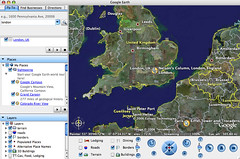 I've just seen the latest BA tv ads and, just like ITN news, they use Google Earth. The ad takes viewers on a tour of the world using the search giant's software, highlighting destinations and prices as it goes. It's a great example of how the web is influencing TV and the power of the Google Earth tool.
I've just seen the latest BA tv ads and, just like ITN news, they use Google Earth. The ad takes viewers on a tour of the world using the search giant's software, highlighting destinations and prices as it goes. It's a great example of how the web is influencing TV and the power of the Google Earth tool.
